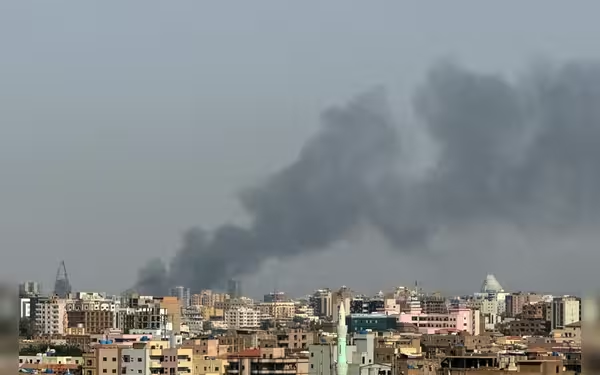Saturday, November 16, 2024 07:27 PM
Egypt Rejects Allegations of Involvement in Sudan Conflict
- Egypt denies air force strikes against RSF in Sudan.
- Dagalo accuses Egypt of interference in Sudanese war.
- UAE's support for RSF raises international concerns.
 Image Credits: arabnewspk
Image Credits: arabnewspkEgypt denies involvement in Sudan conflict amid serious allegations from RSF leader Dagalo, highlighting complex international dynamics.
Cairo has recently found itself at the center of a heated controversy regarding the ongoing conflict in Sudan. The war, which has been raging since April of last year, involves the Sudanese army and the Rapid Support Forces (RSF), led by Mohamed Hamdan Dagalo. This conflict has resulted in the tragic loss of tens of thousands of lives and has created the world’s largest displacement crisis, forcing countless individuals to flee their homes in search of safety.
In a video released online, Dagalo made serious allegations against Egypt, claiming that the Egyptian air force has been conducting strikes against his forces near Jebel Moya, a strategic area located south of Khartoum. He stated, "Egypt is fighting us," and accused the country of being one of several nations interfering in the Sudanese conflict, which he claims also includes Iran.
Dagalo's accusations come amidst a backdrop of complex international involvement in the Sudanese war. Reports indicate that Iran has supplied the Sudanese army with MoHajjer-6 drones, which have been verified by weapons experts. This support has seemingly bolstered the army's efforts to advance towards the capital, Khartoum.
In response to Dagalo's claims, Egypt's foreign ministry issued a statement firmly rejecting the allegations. The ministry stated, "Egypt denies the allegations... regarding the participation of the Egyptian air force in the battles taking place in brotherly Sudan." This denial underscores Egypt's position in the conflict and its historical ties with the Sudanese army, particularly with army chief Abdel Fattah Al-Burhan, who has maintained a close relationship with Egyptian President Abdel Fattah El-Sisi.
Analysts have pointed out that the war in Sudan has transformed into a battleground for various proxy forces, with the United Arab Emirates (UAE) being highlighted for its support of the RSF. In December, UN experts monitoring an arms embargo on Sudan's Darfur region reported credible allegations that Abu Dhabi had supplied weapons to Dagalo's forces using cargo planes.
Despite the UAE's involvement, the United States has recently urged the UAE to reconsider its support for the RSF, even as President Joe Biden has designated Abu Dhabi as a "major defense partner." This contradiction raises questions about the complexities of international alliances and the impact they have on regional conflicts.
Both the Sudanese army and the RSF have faced accusations of committing atrocities during the war, including targeting civilians, indiscriminate shelling of residential areas, and obstructing humanitarian aid. The RSF, in particular, has been accused of severe human rights violations, including crimes against humanity, systematic sexual violence, and ethnic cleansing.
As the situation in Sudan continues to evolve, it is crucial for the international community to remain vigilant and engaged. The conflict not only affects the lives of millions in Sudan but also has broader implications for regional stability and security. Understanding the dynamics at play is essential for fostering peace and ensuring that the voices of those affected by this devastating war are heard.













